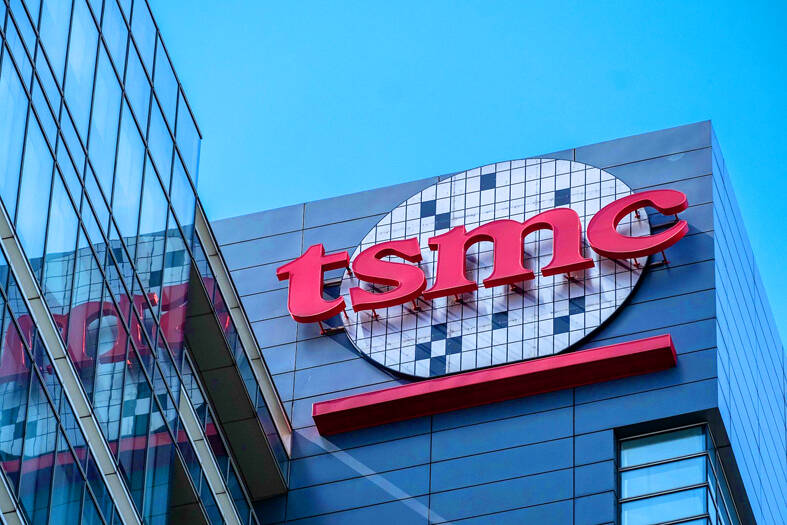Taiwan Semiconductor Manufacturing Co (TSMC, 台積電) yesterday said it has signed a joint procurement contract with ARK Power Co (誠新電力) to provide 20 terawatt-hours of solar energy as part of the chipmaker’s broader efforts to reduce its carbon footprint together with companies in its supply chain.
TSMC is leading an environmental, social and governance innovation model of domestic renewable energy joint procurement by creating a platform to match renewable energy with industrial power consumption.
The agreement enables TSMC as well as suppliers and subsidiaries that would like to purchase renewable energy to be matched with ARK Power, which assists in assessing their electricity demand and planning the best blueprint for renewable energy adoption.

Photo: Lam Yik Fei, Bloomberg
Since last month, TSMC suppliers have signed memorandums of understanding to procure renewable energy to jointly help the local semiconductor supply chain reduce the industry’s carbon footprint, TSMC said in a statement.
Through the joint procurement model, participating suppliers are assured of long-term contracts with stable pricing, thus lowering the threshold for TSMC suppliers and subsidiaries to adopt renewable energy, it said.
The agreement provides 1,000GWh per year of renewable energy for 20 years, or 20 terawatt-hours in total, equivalent to the annual electricity consumption of 250,000 households, it said.
TSMC is to take up 500GWh per year, while inviting suppliers to jointly subscribe to the other half.
Altogether, this venture is expected to cut about 500,000 tonnes of carbon emissions per year.
“Through this innovative joint procurement model for renewable energy, we join hands with our industry partners to promote a sustainable low-carbon semiconductor supply chain,” J.K. Lin (林錦坤), senior vice president of TSMC’s Information Technology and Materials Management & Risk Management, said in the statement.
As a solar energy developer, ARK Power’s parent ARK Solar Energy Co (誠新綠能) said it expects to provide a total of 2 gigawatts of electricity within three years.

PROTECTION: The investigation, which takes aim at exporters such as Canada, Germany and Brazil, came days after Trump unveiled tariff hikes on steel and aluminum products US President Donald Trump on Saturday ordered a probe into potential tariffs on lumber imports — a move threatening to stoke trade tensions — while also pushing for a domestic supply boost. Trump signed an executive order instructing US Secretary of Commerce Howard Lutnick to begin an investigation “to determine the effects on the national security of imports of timber, lumber and their derivative products.” The study might result in new tariffs being imposed, which would pile on top of existing levies. The investigation takes aim at exporters like Canada, Germany and Brazil, with White House officials earlier accusing these economies of

Teleperformance SE, the largest call-center operator in the world, is rolling out an artificial intelligence (AI) system that softens English-speaking Indian workers’ accents in real time in a move the company claims would make them more understandable. The technology, called accent translation, coupled with background noise cancelation, is being deployed in call centers in India, where workers provide customer support to some of Teleperformance’s international clients. The company provides outsourced customer support and content moderation to global companies including Apple Inc, ByteDance Ltd’s (字節跳動) TikTok and Samsung Electronics Co Ltd. “When you have an Indian agent on the line, sometimes it’s hard

‘SACRED MOUNTAIN’: The chipmaker can form joint ventures abroad, except in China, but like other firms, it needs government approval for large investments Taiwan Semiconductor Manufacturing Co (TSMC, 台積電) needs government permission for any overseas joint ventures (JVs), but there are no restrictions on making the most advanced chips overseas other than for China, Minister of Economic Affairs J.W. Kuo (郭智輝) said yesterday. US media have said that TSMC, the world’s largest contract chipmaker and a major supplier to companies such as Apple Inc and Nvidia Corp, has been in talks for a stake in Intel Corp. Neither company has confirmed the talks, but US President Donald Trump has accused Taiwan of taking away the US’ semiconductor business and said he wants the industry back

PROBE CONTINUES: Those accused falsely represented that the chips would not be transferred to a person other than the authorized end users, court papers said Singapore charged three men with fraud in a case local media have linked to the movement of Nvidia’s advanced chips from the city-state to Chinese artificial intelligence (AI) firm DeepSeek (深度求索). The US is investigating if DeepSeek, the Chinese company whose AI model’s performance rocked the tech world in January, has been using US chips that are not allowed to be shipped to China, Reuters reported earlier. The Singapore case is part of a broader police investigation of 22 individuals and companies suspected of false representation, amid concerns that organized AI chip smuggling to China has been tracked out of nations such